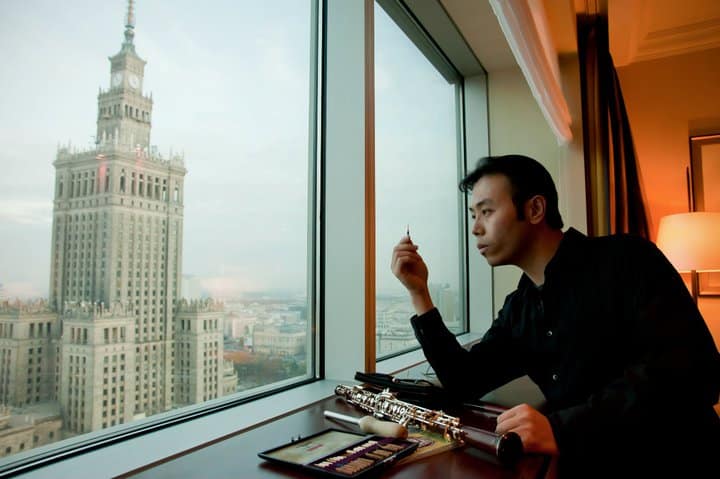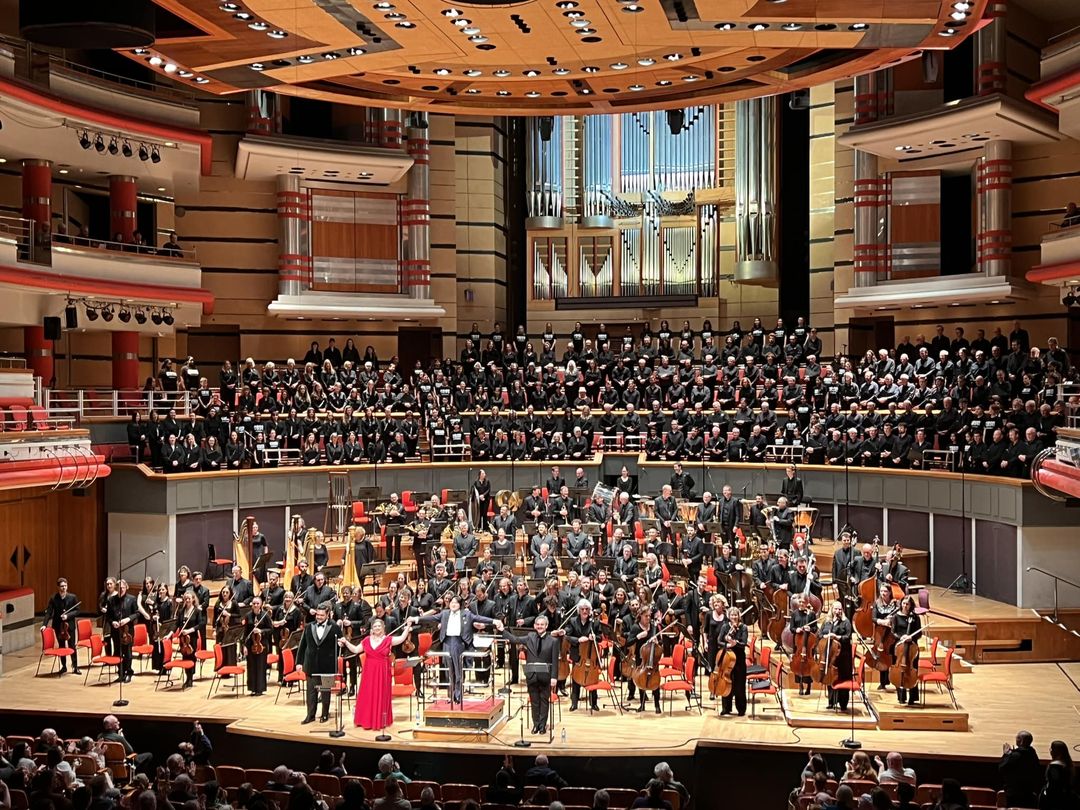Slavery opera wins a Pulitzer
NewsThe 2023 Pulitzer Prize for Music was awarded last night to the opera Omar, by Michael Abels and Rhiannon Giddens.
The opera, about slavery in the US, was premiered on May 27, 2022, at the Spoleto Festival USA in Charleston, S.C.
It is based on an 1831 Arabic memoir, A Muslim American Slave: The Life of Omar ibn Said, translated into English in 2011.
Giddens (pictured) is artistic director of Silkroad and music director of the next Ojai Festival.






But why tell the Arabic autobiography of an African Muslim slave in America in the quintessential European form of opera, in European musical mode, in a European language?
As he was writing his autobiography, you think Omar ibn Said was inspired by strains of The Abduction from the Seraglio, or The Italian Girl in Algiers, as whistled by his White owner?
That’s a curious line to draw.
The very opening of the opera is Omar, singing in Arabic, unaccompanied. A call to prayer, I believe? Absolutely his language and music. From there we morph into the music that serves the medium it is being presented in; western. But throughout, there are African rhythms and instruments being used, and when the story moves to the US, folk elements and themes are introduced as well. There is a dance scene in the second act which draws on the musical traditions of the Black community of the time, which of course had its roots in African music. In the background are projections of some of the oldest archived film of Black people square dancing, moving through the ages to present day, showing the link in styles between then and now.
The final aria of Omar is text of his own words, drawn directly from his writings.
The notion that using the music of the here and now is somehow disrespectful to the man and is story, is a pretty weak argument to make.
see also Verdi/Nabucco and countless other examples.
Respect is not synonymous with consent.
A whole lot of stuff was imposed on this man, in the name of some good, without necessarily his consent, from his enslavement, to his conversion to Christianity, now an opera.
Take the exploitation of his image. Islamic art shuns even prohibits portraiture, would he approve the use of his image blown up and projected onto the stage curtains and then manipulated by a computer to make him blink? (We’ve all tried that app online, taking a photo of an ancestor and making them move their head, it’s creepy.) What next, use AI (deepfake technology) to make him sing the whole opera for us?
It is exploitation, whether technological or artistic, and it is glaringly so in a medium and cultural form of his enslavers that he could not consent to in reproducing his words, his voice, his image.
Nonsense. Consent has never been a requirement for portrayal of historical figures. Nor should it be.
“Islamic art shuns even prohibits portraiture…”
Oh, man, you don’t realize just how off you are. Only some Arab countries maintain that prohibition against portraiture. Omar was from Senegal, and West African Islam is much laxer than the Arab version. In fact, the Senegalese absolutely love portraits, including of their Sufi leaders. Go into almost any hole-in-the-wall restaurant in Senegal, and there will likely be a photo on the wall of one.
Moveover, this region is fond of sung tales of the ancestors, one of the courtly arts. The writing of an opera about a person’s life would not have seemed something particularly strange to this man.
In fact, what seems offensive here is your knee-jerk reaction without even taking into account the actual place and culture that the subject of this discussion hailed from.
Why not? Philip Glass has told the story of Akhnaten, Gandhi etc …..
So Omar is now variously called a “historical figure” and compared to “Akhnaten” and “Gandhi”, in order to diminish his expectation of privacy and consent, as if we don’t have enough historical examples of Europeans bringing Africans and Native Americans, live or their bones, to exhibit around all over Europe in the name of scientific and cultural enlightenment.
Imagine your American great grandmother was kidnapped by the Japanese, forced to be a comfort woman and converted to Shintoism, then centuries later, a Kabuki theatre piece is made about her life, you think your great grandmother would be pleased if told, but this is KABUKI the highest and noblest art form fit for emperors and Gods, or might she just say, just repatriate my bones to Nebraska and bury me among my Christian kin?
It would depend on the quality of the piece. Omar – like any other work of art – should be judged on its own merits. Since it seems obvious you haven’t seen or heard it, you have no basis to make that judgement. And what makes you so sure that the work itself doesn’t transcend the medium?
Of course, chosen entirely for its musical merits,,,,
Do you have any evidence that it wasn’t?
Well, given that Rhiannon Giddens has produced multiple award-winning outstanding CDs, is a trained opera singers, has won Grammys, a MacArthur Genius grant, and collaborated with symphony orchestras and opera houses around the world, you might think she has quite a bit of musical merit, yes.
Sometimes I wonder if people with comments like this actually like opera. A major American opera festival commissions a newly composed opera, gives it a major release, and it gains wide recognition from the cultural world at large, and all they do is complain (of course, we all know *why* they complain). Seems they actually don’t like opera and don’t wish it to succeed…
YES! Having New Opera receive a Pulitzer is GOOD for our *living* art form. Period.
Rhiannon Giddens also hosted the (dormant?) podcast Aria Code for the Metropolitan Opera and WQXR, an excellent series of talks on opera and interpretation.
Surely the quality of the music was the only criterion used in deciding the winner…right??
I have not heard this work, so refrain from making speculations of this nature. Have you heard it?
I attended the Boston Lyric Opera performance last weekend and it is stellar. Giddens and Abels work is a shining example of what modern opera can be.
Opera is also theater; it has also served as social or political commentary for much of its history (think of Nabucco, for just one example). Its theatricality by rights should be a criterion in addition to its musicality, and its topicality is hardly out of bounds.
Will this opera be as successful as La Boheme – even Leoncavallo’s version? Will it be remembered even ten years hence?
What’s your point?
PS – should we ban Arriaga’s only opera, ‘Los Esclavos Felices’ (The Happy Slaves) because its title is now politically incorrect? The composer wrote it around 1820, when he was only 14. It had only one performance in the theatre in Bilbao – a huge success – after which the young composer took a bow. The score was then placed in the attic of the theatre, where rats devoured all but the overture and a few other fragments.
The sparkling overture has been recorded many times and I guess that I must now play it on headphones under cover of darkness to avoid arrest and trial. The opera was reconstructed in the 20th century and there is some evidence to suspect that there may be another copy of it somewhere – I’d love to hear it or even the surviving fragments, given the quality of Arriaga’s handful of extant works.
Fabulous non sequitur. A plus, no notes.
One more absolutely stupid “expose” of slavery fixated on “black” experiences as if there were not more than enough examples of the evils of one group “enslaving” another simply because the group can but meant all the while to indicate that “blacks” suffered more than anyone else and hence are “owed” the guilt of whites (when the enslavement occurred in Africa and the first profit was from Arab/African commerce). Sick of this pretension. Slavery is evil, true. But it is historic and still extant. And while we are on that subject, the first enslavement is of females by males….
So no one is allowed to create another artistic statement that deals with American slavery? You’ve determined that everything that’s worth saying has already been said? I wonder from where you derive that authority.
And please tell us what other topics have been so thoroughly exhausted that nothing further should be said about them.
Show us on the doll where the opera hurt you.
Why the use of quotes? Why don’t you just say what words you really mean?
You are the most predictably thoughtless and shamefully retrograde poster here, and that is saying something. Do you have any idea of the sheer stupidity and offensiveness of what you are claiming?
I mean, it would be cool if she actually composed but from what I’ve read she provided demo recordings and maybe tapes of her singing to another guy who actually scored and orchestrated it. But ya know. Pulitzer has been completely irrelevant for years now.
The “other guy” has a name: Michael Abels. And he is also named in the Pulitzer award.
And why would it matter if the end product is brilliant? Not saying it is or isn’t because I haven’t seen/heard it but that should be the only criteria, not whether it was written, sung, semaphored or anything else.
She also wrote the libretto, did the research, wrote the major arias and dance numbers, collaborated on the instrumentation, performed in the workshops….
…sorry…was that not enough work for you to be considered co-creator?
The “other guys” is a world renowned composer of many major films including the works of Jordan Peele. He has been Emmy and Grammy nominated and he currently has a Pulitzer Prize.
Saw “Omar” in L.A. Great opera!
Finally, someone who has actually seen it comments!! I heard part of a broadcast (sadly tuned in too late) and found Omar intriguing. I’m looking forward to hearing and seeing it in San Francisco next season.
Rhiannon Giddens is such a fine musician. Her bluegrass is simply wonderful. I’m normally a little sceptical of the ‘pop star writes opera’ genre but this could be well worth seeking out.
Slavery, slavery, slavery, a story that lacked contemporary meaning 150 years ago, but Lefties beat it like a dead horse. How about an opera about racial progress?